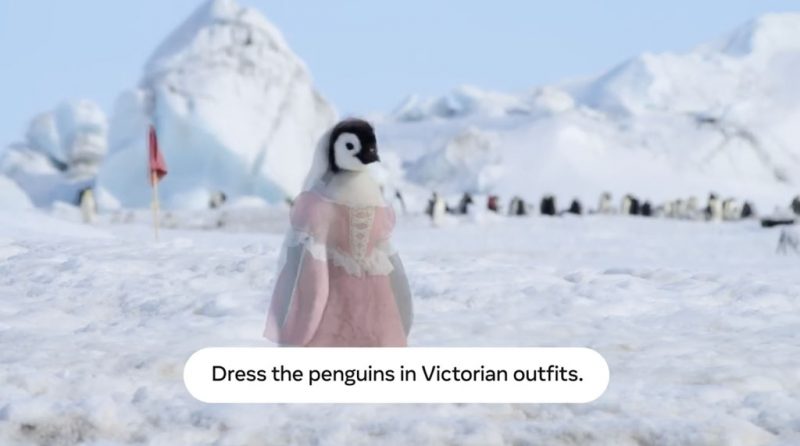
Meta’s New Movie Gen Transforms Video Creation with AI Magic
The world of artificial intelligence continues to evolve at breakneck speed, and Meta is adding another milestone to that journey with the announcement of its latest innovation: Movie Gen, an AI-powered video generator. While competitors like OpenAI have made similar strides in the AI video space, Meta’s Movie Gen brings a unique blend of video generation, editing, and customization that could redefine how we create visual content. Here’s what you need to know about Meta’s new tool and its potential impact.
What is Movie Gen?
Movie Gen is an advanced AI tool that can automatically generate high-quality videos from simple text prompts. Whether you want to create entirely new footage or enhance existing video clips, Movie Gen steps in to make the process seamless. The tool even has the capability to edit still images, like headshots, and transform them into animated video scenes. Additionally, sound is automatically added to the videos, with AI generating ambient noise, sound effects, and background music that complement the visual experience.
IS YOUR COMPUTER SECURE?
FREE Malware Removal
Detect & Remove Adware, Viruses, Ransomware & Other Malware Threats with SpyHunter (FREE Trial)
IS YOUR COMPUTER SECURE?
FREE Malware Removal
Detect & Remove Adware, Viruses, Ransomware & Other Malware Threats with SpyHunter (FREE Trial)
IS YOUR COMPUTER SECURE?
FREE Malware Removal
Detect & Remove Adware, Viruses, Ransomware & Other Malware Threats with SpyHunter (FREE Trial)
For example, Meta showcased a still image of a woman’s headshot being transformed into a dynamic scene, where she sits in a pumpkin patch enjoying a drink. This kind of customization highlights how powerful Movie Gen’s technology could be for creators who want to bring static images to life or modify videos in creative ways.
Beyond Video Creation: Editing with Ease
Movie Gen doesn’t just create new videos—it also gives users the ability to alter existing footage. Whether it’s changing the background, adding props, or adjusting transitions, the tool provides numerous ways to enhance videos. One notable example shared by Meta showed an illustration of a runner, which the AI then modified in multiple ways: adding pompoms in one frame, placing the runner in a desert in another, and even putting him in a dinosaur costume. These modifications can be easily prompted with just a few words, making it a powerful tool for video editors.

This ability to manipulate and customize videos on such a granular level holds immense potential for content creators, from casual users on social media to professional video producers.
Meta’s Strategy in the Competitive AI Landscape
Meta’s move to introduce Movie Gen comes in the wake of growing competition in the AI video space. Earlier this year, OpenAI revealed Sora, another AI-powered video generator. While Sora has yet to be released publicly, it set the stage for further innovation in the field, and Meta has clearly taken note.
However, according to Chris Cox, Meta’s chief product officer, Movie Gen won’t be commercially available anytime soon. It’s still in the experimental phase, with challenges like high costs and long generation times standing in the way of a broader rollout. Nonetheless, Meta’s announcement highlights its intention to compete aggressively in this space, as major tech companies like Google and OpenAI continue to push the boundaries of AI-generated content.
Ethical Concerns and the Future of AI-Generated Videos
As with many AI-driven technologies, Movie Gen raises important ethical questions. The use of AI image generators has already sparked debates around issues like content ownership and misuse, and video generation brings these concerns to an even larger scale.
One controversy surrounding AI video generators is the use of scraped data for training models. For instance, AI startup Runway has faced criticism for training its video generator on thousands of YouTube videos without permission—a direct violation of YouTube’s terms of service. While Meta claims it used “a combination of licensed and publicly available datasets” to train Movie Gen, the company has yet to fully disclose which sources were used.
Beyond data usage, many in the creative community are worried about how AI video generators will impact their livelihoods. Filmmakers, writers, and artists have already expressed concerns about being displaced by AI-generated content, and these fears were central to the recent Hollywood strikes by SAG-AFTRA and the WGA. As AI continues to evolve, it’s clear that ongoing discussions about its ethical implications will need to be addressed.
A New Era of AI-Driven Creativity?
While Meta’s Movie Gen may not be ready for mainstream use just yet, its announcement signals a new era of AI-driven video creation. From generating high-definition videos with realistic sound to offering intuitive editing tools, Movie Gen could revolutionize the way we create and interact with video content.
As Meta and other tech giants continue to develop these tools, the potential for AI to enhance creative workflows seems limitless. However, as with all technological advancements, it’s crucial to strike a balance between innovation and ethical responsibility. How Meta and its competitors navigate this landscape in the coming years will determine the future of AI-powered content creation.